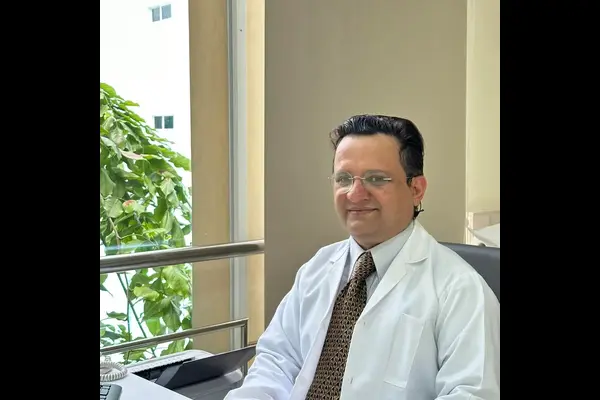How to Protect Your Spine – Dr. Bashyal’s Must-Watch Advice
By Anjana Chaudhary - Jun 28, 2025 | Updated: June 28, 2025 | 5 min read
Lately, more and more women are having problems with their spines and dealing with constant pain. Dr. Santosh Kumar Bashyal, a renowned bone and spine surgeon who trained at Harvard, discusses the causes of most back and spinal health issues in Nepal and shares methods to minimize the pain and treat these problems.
Dr. Santosh Kumar Bashyal, a renowned bone and spine surgeon who trained at Harvard, explains the causes of most back and spine problems in Nepal and how to treat them to minimize pain.
Dr. Santosh Kumar Bashyal is a Harvard-certified orthopedic surgeon. He explains the latest in treatments regarding spinal health issues and pain management. He notes that osteoporosis and hormone shifts are core problems in spinal health in Nepal.
Dr. Bashyal offers some tried-and-true ways to avoid these problems in addition to fresh and efficient pain management options. His evidence-based approach benefits both patients and medical professionals.
A Specialist’s Journey from Nepal to Harvard
As a child, Dr. Santosh Kumar Bashyal developed a passion for medicine while working in his family’s veterinary practice. A friend of his father’s granted him special permission to visit a morgue, and he became fascinated with the functioning of the human body.
He recognized that Nepal needed better spine care, so he journeyed to various Harvard-linked hospitals to get training. He focused on providing quality spinal care at cheap rates.
Dr. Bashyal decided to advance spinal care in Nepal after his return. He intended to assist rural residents by applying the knowledge he gained overseas.

Spinal Health Disparities in Nepal
Dr. Santosh Kumar Bashyal explains the disparity in Nepal’s health sector, particularly between urban and rural areas. He notes that many rural areas lack enough resources and facilities.
He recalls seeing this difference firsthand as a kid. Lots of families in his town had bad back issues from hard farm work, but they couldn’t afford treatment.
According to Dr. Bashyal, back issues are becoming more common in urban areas due to contemporary lifestyles and poor posture, and motorcycle accidents exacerbate the condition. He also criticizes the overuse of painkillers in present society for quick relief, stressing that delays in proper treatment can lead to chronic issues.
Dr. Bashyal addresses Nepal’s health disparities by advocating for government action and implementing solutions such as safe lifting methods and workplace ergonomics education. He also runs mobile spine clinics to provide affordable care and preventive care to all Nepalis.
READ MORE: When Your Cancer Comes Back: The Difficulty of Seeing Son Cry
Understanding Body Pain & Spine Health
In modern society, numerous men and women are suffering from chronic back pain and some spinal issues. In general, these problems stem from preventable actions such as bad posture while working or repetitive strain on the back.
People who are starting to develop back or spinal pain frequently start with modest body pain or discomfort. These emotions are often dismissed as transient, which is a significant issue.
Dr. Santosh Kumar Bashyal claims that pain is an indication that our bodies are not being cared for. He clarifies the consideration towards any suffering.
According to Dr. Santosh Kumar Bashyal, the human spine consists of tiny, complex parts. He cautions that if women are not aware of their posture and physical strain during pregnancy and hormonal changes, it can cause damage to their spine. Dr. Bashyal says women’s spines have to endure more stress.
Why Women Experience More Spinal Health Issues
Dr. Bashyal says women have more bone and spine trouble than men because of biology and how they live. He says pregnancy and menopause can mess with a woman’s spine.
Dr. Bashyal advises women to incorporate mindfulness into their daily lives in addition to strength training and taking calcium and vitamin D. This can help reinforce their bodies against spinal problems.
Dr. Bashyal also says women in their 40s who are entering perimenopause should think about getting early bone density scans.
The Role of Spirituality in Healing & Pain Relief
Dr. Santosh Kumar explains why he brings spirituality into his work. He says people tend to find comfort in faith, especially in places with strong traditions, such as Nepal.
Nepal is deeply rooted in spirituality. It is prevalent in all sectors of life, including health. Dr. Bashyal states that the faith people have in their spirituality can provide them comfort in times of stress or pain. He intends to enhance the nation’s healthcare system by fusing this with advanced medical procedures.
Dr. Bashyal also explains that faith itself does not need to come in the form of religion. Some people may find it in practicing yoga and rituals. He explains that such faiths are perfectly acceptable as well but advises against having faith alone.
He voices his opinion, stating that faith itself cannot heal the problem; only extensive therapy can do that, but faith does make the process a bit easier, thereby promoting a bio-psycho-social-spiritual approach to health.
Embracing a Balanced Approach to Pain Relief
As the number of spinal health issues rises throughout Nepal, it is getting more and more important to raise awareness regarding the subject. Dr. Santosh Bashyal shares his insights on the core reasons for spinal problems and his approach to treating patients with a combination of practical medicine and physical rehab.
In this video, Dr. Santosh Kumar Bashyal discusses spinal health issues that women, particularly those over 30, suffer from. He explains the causes of these problems as well as some preventive actions that can minimize the chances of spinal injuries or problems.
Dr. Bashyal also discusses his reasoning for incorporating spirituality within his work and how faith might help patients who endure pain receive relief. Dr. Bashyal continues by advocating for healthcare facilities in Nepal and emphasizing the importance of raising awareness about spinal health.







